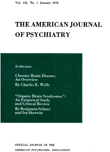IMMEDIATE AND FOLLOW UP RESULTS OF ELECTROSHOCK THERAPY
Abstract
Results of the follow up study of 279 patients who received electroshock therapy indicate that this treatment is very effective in the treatment of involutional melancholia and manic-depressive psychosis. The percentage of recoveries reported for this group is slightly less but comparable with that reported one year ago(2).
Manic patients do not hold their recovery as well as those who have an agitated depression. There is no evidence to indicate that electroshock treatments may prevent future psychotic attacks, nor that it might interfere with spontaneous clinical recovery.
Electroshock therapy is not effective in the treatment of schizophrenia. It is of doubtful value in the treatment of psychoneuroses.
Traumatic skeletal injuries may be decreased by the use of intocostrin (Squibb). Cardiac and pulmonary complications, vasomotor collapse, spasticity, subconjunctival hemorrhages may develop. Memory changes always occur to some degree during the course of treatment. These memory defects do not seem to be permanent.
Access content
To read the fulltext, please use one of the options below to sign in or purchase access.- Personal login
- Institutional Login
- Sign in via OpenAthens
- Register for access
-
Please login/register if you wish to pair your device and check access availability.
Not a subscriber?
PsychiatryOnline subscription options offer access to the DSM-5 library, books, journals, CME, and patient resources. This all-in-one virtual library provides psychiatrists and mental health professionals with key resources for diagnosis, treatment, research, and professional development.
Need more help? PsychiatryOnline Customer Service may be reached by emailing [email protected] or by calling 800-368-5777 (in the U.S.) or 703-907-7322 (outside the U.S.).



